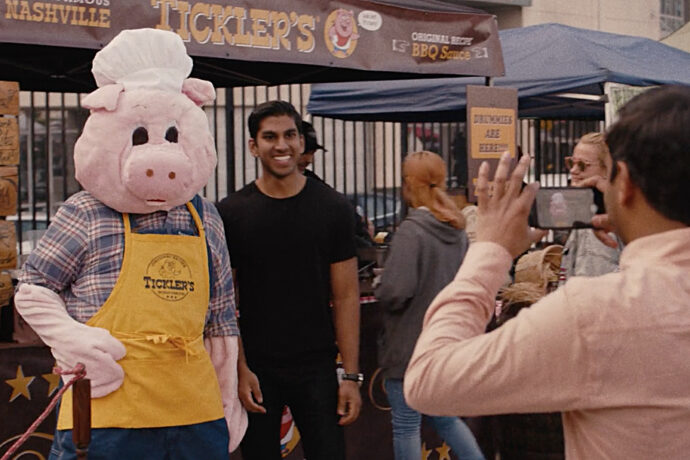To call Aziz Ansari’s Netflix series Master of None “peak TV” is not to do it justice. It has a lightness to it that makes it a relief from the overwrought self-importance of shows that define the medium for the moment.
This is not to say the show is never serious—Ansari is part of a cohort of creators who use their platforms to center experiences that most media exclude or marginalize. However, approaching this season’s episode “Religion,” which he co-wrote with his brother Aniz Adam Ansari, I’d like to think beyond the presentation of experience and ask about the politics of Muslim visibility.
Does the liberal mainstream only value Muslim self-presentation to the degree that it looks familiar and safe?
We know all too well that the dominant media caricature of Muslims is as different and dangerous. I do not want to suggest any equivalence between tropes from Homeland or 24, written by non-Muslims, and Ansari trying to counter these in making a show about his experiences. But I do want to ask how a narrative of assimilation counters that prejudice, when Muslims are “humanized”—more fully given agency and realized as subjects—only to the extent that they present themselves “like us.”
The Master of None “Religion” episode presents its characters as sympathetic via their willingness to separate themselves from Islamic contexts and understandings. The plot focuses on Ansari’s character Dev Shah feigning piety for the sake of some more observant relatives only to end up tempting his cousin to try a Cuban sandwich. The two cousins cap off a day of bonding at a barbecue festival, sampling varieties of pork.
A note on assimilation: In the liberal formula, renouncing tradition—rather than deliberate engagement with it—is understood to exemplify freedom and choice.
Saba Mahmood has argued that religious transgression occupies an almost sacred place in Western approaches to modern art. Transgression signals human achievement, pleasure, and vulnerability over and against conservative inhibition, inspiring an almost pietistic defense of freedom against the sensibilities of orthodox religion. In Salman Rushdie’s novel The Moor’s Last Sigh, “Step across this line” is a mantra repeated by many of the characters who need to transgress community and tradition in order to achieve selfhood, and it serves as title for the author’s Tanner Lectures on Human Values.
A prerequisite for aspiring to “human values” appears to be a willingness to separate from tradition.
In Master of None, Dev displays an ironic rapture at the joys afforded to cosmopolitan consumers: he is almost awestruck by the erotics of choice in dating apps and exotic restaurants. Dev’s religious relatives are not portrayed as foreign, austere, or judgmental (they’re basketball fans!) but while these characters are not flat caricatures, they are not given a full voice to express something potentially different from liberal religion.
As much as it seeks to capture the life of young people living in between traditions and new lives, the conflict in the episode between Dev and his parents reverts to liberal formulas of difference and non-interference. Dev’s revelation displeases his mother and father, played by Fatima and Shoukath Ansari, the creator’s actual parents. “Look I get it, for you guys, religion has this cultural value. It’s not like that for me.” Religion is presented as connecting one to the past—rather than, say, focusing one’s life in the present—and, again, the ensuing dialogue offers no rebuttal to this perspective.
Other than “culture”, the episode also presents religion as a matter of personal interpretation. Dev’s mother urges him to read the Qurʾān she gave him, as a symbol of safekeeping, she says, rather than a text with meaning in and of itself. He texts her a translation of 109:6, “For you your religion, and for me my religion,” which the character takes as an endorsement of his freedom to break from tradition.
John O’Brien’s forthcoming Keeping it Halal portrays the social life of young Muslims in the U.S. who live amid the tensions of a dominant secular culture, conservative social expectations, and personal religious commitment. What emerges is not the cementing of a connection with the authoritative past or even necessarily a cogent response to a suspicious broader society that associates observance with militancy, but an understanding of negotiated indeterminacy and multiple belongings that extends beyond a reading of religion as culture and choice.
The point here is not to suggest that Ansari should have portrayed different experiences of religion than his own but to rethink how the liberal imagination constrains and politicizes Muslim visibility and recognition.
Ansari is clearly aware of some of those constraints, and Master of None does address, in part, contemporary Islamophobia. In his monologue as host of Saturday Night Live the day after Donald Trump’s inauguration, he joked about the trope of the Muslim call to prayer in Western media, so often accompanied by exotic, foreboding music that creates an ambiance of danger. The implication is that Islamic practice, even the daily prayers, is menacing and different.
The work of Master of None is to show Muslims as not so different, as living within familiar liberal frameworks of having a different past but apt to choose the good life as contemporary urban America defines it.
History as well as political and legal culture have formed those frameworks, and the media by and large fit within them. It remains for a creative work to contribute a different sense of “us,” with people responding to pressure and maintaining affective communities in different ways to reach a popular audience in this moment of anxiety and suspicion.





